Rachel Held Evans's Blog, page 31
October 9, 2013
“Make It Work”: A Homily on Luke 17:5-10

After surviving the most terrifying flight of my life, (which I’ll write about later because it will be cheaper than therapy), I had the honor of speaking at St. Matthew’s Episcopal Church in Louisville, Kentucky this past weekend.

The congregation at St. Matthew’s gathers in a beautiful sanctuary built around the communion table. The Sunday morning service provided my first opportunity to speak from the lectionary, which made me a bit nervous at first, but which I found surprisingly freeing and fun in the end. I liked having an “assignment” rather than just ruminating over whatever’s on my mind on the one hand or digging out something old and over-rehearsed on the other. It occurred to me that traditions that make communion the center of worship and that use the lectionary for sermon topics have found some pretty effective built-in ways to guard against the phenomenon of celebrity pastors. Maybe we evangelicals can take some cues from our brothers and sisters in this regard. (More on that later as well.)
So this is my sermon…or homily, or “sharing time” if you are troubled by my gender, or whatever…from Sunday morning. If you would like to listen to it instead, you can do that here.
***
Reading: Luke 17:5-10
Well, this is my first time speaking from the lectionary. I’m an evangelical, and when it comes to sermons, we evangelicals prefer to just “wing it” and them blame it on the Holy Spirit if it doesn’t go well, so this is a little different for me.
But I like it. As a writer, I recognize that creativity thrives within constraints and I like how the lectionary gives us the chance to wrestle with the same text together, as a community. Also, as a lifelong churchgoer who has seen her fair share of pastor-centric churches, I like that the lectionary lets Scripture set the agenda for the sermon…which, when you think about it, is a pretty evangelical way to look at it. So thank you for the opportunity. It’s a joy to be with you all today. I’m so grateful for the warm welcome.
Now my mainline friends warned me that when you preach from the lectionary, you never know what you’re going to get, that sometimes you just have to “make it work” as designer Tim Gunn would say. And sure enough, the story we find in the lectionary today is one of those stories that will sorta throw you for a loop because it’s one of those stories in which Jesus gets a little testy. And it’s not with the Pharisees, not with the rich or the powerful, but with his friends—the disciples.
The story begins with the disciples approaching Jesus with a seemingly reasonable request: “Lord! Increase our faith!” It’s an understandable request given the sort of things Jesus has been teaching:
Love your enemies.
Bless those who curse you.
Forgive even when it’s not deserved.
Give without expecting anything in return.
Be ready to take up your cross.
But Jesus responds to the disciple’s request with a touch of irritation— the Greek would suggest a bit of snark—and he tells them that if they had faith as small of a mustard seed, they could command a mulberry tree to uproot itself and replant in the sea…and it would obey.
He then proceeds to ask them whether a servant would be so cavalier as to demand a meal with his master, or special praise for doing his basic household duties.
Now, this may strike us as a little odd because we know Jesus wasn’t in the habit of speaking unkindly about slaves or people of low status. Just last week we heard the familiar story of the rich man and Lazarus, where a beggar is assigned higher honor than his rich neighbor. And we know also that Jesus often compared the kingdom to a banquet in which all are invited—slave and free, rich and poor alike—and he often talked about how the least among us would take the high place of honor at that Table to eat with the Master. Jesus was in the business of turning hierarchies and power structures on their head, so why does he resort to conventional social structures to make this point to the disciples?
We have to keep in mind that, throughout the gospels Jesus reserves his harshest criticisms for the proud and saves his most biting satire for the folks who need to be brought down a peg. From the beginning, Jesus’ ministry was about lifting up the humble and humbling the proud, of challenging those in authority and giving voice to the marginalized, so it’s safe to assume that there must have been an element of pride or entitlement at work in the disciple’s request to warrant this sort of response.
And I wonder if we don’t get a little clue as to what that was in Jesus’ strange—downright bizarre—image of a mulberry tree getting planted in the ocean. Imagine it: A mulberry tree suddenly uprooting itself, flying through the air, and then replanting itself in the sea. What on earth is that about? Why would anyone want to do that? What an odd expression of faith!
I wonder if Jesus was gently, playfully poking fun at the disciples’ ongoing preoccupation with flashy signs and wonders as a measure of true faith. They’d been asking for an upgrade in supernatural powers, at one point suggesting it sure would be nice to be able to call down fire from heaven every time someone turned them away from their home. (Jesus responded with similar agitation to that request.)
But the signs and wonders performed by Jesus and described in the gospels always had a point. They were always constructive. They…
Healed
Liberated
Multiplied
Fed
Blessed
Restored
Comforted
They pointed to the mission of Jesus and the purpose of the Kingdom he inaugurated. And today these stories remind us of our own call to…
Heal
Liberate
Multiply
Feed
Bless
Restore
Comfort
There’s nothing more ridiculously useless than replanting a mulberry tree in the ocean! And I wonder if Jesus wasn’t reminding his disciples that faith isn’t manifested in flashy magic tricks, or pointless, self congratulatory displays of power, or in destruction and uprooting, but in daily acts of faithfulness—those quotidian acts of obedience that grow the kingdom, one carefully tended little mustard seed at a time.
It’s helpful here to contrast this bizarre idea of uprooting a mulberry tree with the work of the servant who tends sheep, works the land, plants seeds, makes dinner. I wonder if Jesus isn’t telling the disciples that if they have enough faith to be faithful, then that is enough.
Faith, after all, is a gift. And we don’t have any business telling God we don’t have enough, when God always gives us enough to be faithful. God always gives us enough to do something useful, to “make it work.”
Maybe the mistake the disciples make isn’t so much in asking for more faith, but in thinking they don’t have enough, in thinking God’s gift to them was insufficient.
How easy it is to think we don’t have enough! These guys were in the very presence of Jesus and still they wanted more!
Walter Brueggemann has said: “We all have a hunger for certitude. The problem is the Gospel is not about certitude, it’s about fidelity.”
We’re not so unlike the disciples are we? How often we tell ourselves: “If I only had more faith, I could…”
Do something important
Do something impressive
I’d never struggle with doubt.
I wouldn’t be so scared.
I’d finally be appreciated.
I’d finally know I’m right.
It would finally all make sense.
I struggle with this too. I grew up in the Bible Belt in the midst of the apologetics movement and for the first half of my life, I was super-Christian. I was the first to answer questions in Sunday school. I’d memorized significant portions of Scripture before I turned 10. There was even an award at my private Christian elementary school called “The Best Christian Attitude Award,” and I won it four times in a row.
But, as so often happens to kids who grew up in church, when I reached young adulthood, I started to question a lot of what I was taught about faith and life and ever since then, doubt has been an ongoing presence in my life. Sometimes I wake up in the morning and I’m pretty convinced this whole Christianity thing is a bunch of baloney.
And I can’t tell you how much emotional energy I’ve spent trying to recover that initial certainty, trying to get back to the faith of my childhood, trying win another Best Christian Attitude Award.
But what good is it really? How useful would that really be?
About as useful as uprooting a mulberry tree and planting it in the sea.
Once, I was struggling through a rough week of doubt and, like a good millennial, I took to Facebook to vent my frustration .My friend David left this message on my wall. He said: “Faith is always a risk, a gamble—and adventure, if you will. The line between faith and doubt is the point of action. You don’t need certainty to obey; just a willingness to risk being wrong.”
I was letting my desire for more keep me from working with what I had. I’d convinced myself I needed more faith when what I really needed was more obedience.
Last week we celebrated the feast day of Theresa of Lisieux whose famous “little way” has inspired generations of Christians to honor God by being faithful in the little things….by taking this faith thing one step at a time. Theresa talked often about the smallness of her own faith. But she never questioned God’s goodness or fairness in giving her what she had. She never demanded more because she knew she had been given enough to be faithful. She’d been given enough to obey.
“God would never inspire me with desires which cannot be realized,” she said, “so in spite of my littleness, I can hope to be a saint.”
Theresa (who indeed became St. Theresa), Peter and Paul, Mary Magdalene, St. Francis, Dr. King, Tersa of Calcutta, Nelson Mandela, you and I—we all share the same Master. And that master has given us all the faith we need to be faithful.
So even if it’s just the size of a mustard seed, make it work.



October 8, 2013
Ask an Interfaith Couple…Response
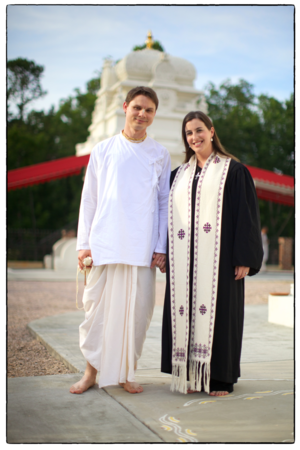
Our latest “Ask a…” installment generated quite a bit of interest, and today I’m pleased to share Dana and Fred’s responses to your questions about being an interfaith couple.
Dana is an ordained in the Southern Baptist tradition and writes about the joys and challenges of her Christian-Hindu marriage in Saffron Cross: The Unlikely Story of How a Christian Minister Married a Hindu Monk. She blogs and tweets on interfaith topics; you can also find her on Facebook.
Fred is a devout Hindu in the Gaudiya Vaishnava tradition who lived as a monk and priest for five years. He blogs on Hinduism and philosophy and works in IT at NC State University.
Dana and Fred were matched on eHarmony in December 2008. Since then, their Christian-Hindu interfaith adventure has included a sex-free Indian ashram honeymoon, austere religious pilgrimages, dietary compromises, deciding when and where to worship, and fights about prayer.
Dana did an excellent job responding to your questions and I hope you enjoy hearing from her as much as I did. Enjoy!
***
From Dana and Fred: Thanks, everyone, for your thoughtful questions. We are grateful for your interest in this topic and hope the conversations will continue. Our prayer has always been that the Saffron Cross story will foster awareness for interfaith discussion and understanding. And thanks, Lydia, Kylie, Alyson, Veronica, Christina, Amanda, and Kat R. for your questions!
From Lydia: Are there perhaps certain ways in which your relationship and marriage is strengthened by your differences in belief/faith, which other same-faith couples do not enjoy?
Our intrinsically different faith traditions have strengthened both our marriage and personal, individual relationships with God in several ways.
To embark on this interfaith adventure, Fred and I both had to step out of the confines and comforts of our individual religious paths. Most of us tend to operate solely within the isolation of our faith communities (this is totally normal and understandable). But in that isolation we tend not to ask tough questions of ourselves, our beliefs, and our traditions. Getting to know someone for whom faith looks differently helps us take the first step out of the comfort zones of the faith communities and the traditions we know and cherish. It’s along these edges that we can most experience spiritual growth, because we’re doing the hard work of asking ourselves, what do I believe? What does my religion espouse? What does my scripture actually say? When we are surrounded by people who, at least on the surface, believe the same things we believe, there’s often no impetus for wonder—no cause to dig deeper and get to the roots of our tenets.
When we first began dating, we had tough questions for each other. Some examples: “Dana, what do Baptists believe?” “Dana, why are you not integrating Christ’s teachings into your daily life?” “Fred, what’s the purpose of deity worship? Why do Hindus need gurus?”
Our wonderings forced me to ask: What do I believe? How has scripture and my tradition informed me? How has my relationship with Jesus affected my life? Has it changed? Am I doing the same things I’ve always done?
I had to return to my Bible, to my seminary books, to the elders and history of my Baptist tradition, and most of all—to my own heart. I had to dig deep, and this resulted in a reignited fire for Christ again.
Fred’s eastern path and our marriage has encouraged me to apply a more Christ-like approach to my lifestyle: what I eat, buy, how I speak and treat others. Fred’s Hinduism has offered me an eastern approach to God: What can I do for God today? As opposed to what the posture I’d always practiced: God, what will you do for me today?
Same-faith couples may take it for granted (or not) that they believe the same things as their partners. Maybe they don’t even discuss Jesus anymore. Maybe they do?
Because Fred and I are ordained within intrinsically different traditions, our constant questions about the other person’s tradition fueled perpetual interest in God. This new energy pulled me from my Christian complacency. (Alise Wright expresses a similar season of examination during her husband’s deconversion, in their “Ask a Mixed-Faith Couple” response).
Fred and I challenge one another to live fully into what our traditions and sacred scriptures have taught us—and as a result, we’re growing together.
From Kylie: To what degree do each of you integrate the nuances of the other's faith into your own practice (if at all?)
We are actually quite intentional about integrating the nuances of both Christianity and Hinduism into our spiritual practices. This stems from our interfaith marriage mantra: “we always worship together.”
We decided on this rule after lengthy discussions on how we’d handle sabbath-keeping. It started with concern: where would we worship? When would we worship? How would we worship?
Instead of choosing to attend church/temple separately, we opted to attend together. This means we go to Baptist church and the temple/ashram together—without fail. On the rides home from worship, we discuss sermons, scripture, rituals, liturgy—you name it! God is always in the center, and the lines are beautifully messy.
Here are some specifics on how this “always worship together rule” has now infiltrated our lives: Fred occasionally teaches Sunday School at my Baptist Church; I fully participation in his faith community’s services and rituals during Hindu festival weekends. I’ve adopted vegetarianism and food offering rituals; Fred’s adopted participation in Baptist’s extemporaneous prayer tradition. We have an altar in our home (an eastern practice) that holds an icon of Christ Pantocrator, photos of Gaura-Nitai deities, Fred’s guru, as well as Christian and Hindu volumes of Scripture and commentaries.
Spectators may observe that one tradition has blurred into the other—and that is purposeful. We still call ourselves Christian and Hindu, but we’ve taken each tradition’s rich, valuable practices, and adopted them for our mutual spiritual path.
From Alyson: Dana, how do you reconcile your church's teachings on heaven, hell, and the afterlife with your husband's very different beliefs? Do you hope/pray for his conversion to Christianity? (Hope this doesn't sound judgmental - I'm honestly curious about his).
My honest disclosure is that I am unabashedly Christian. I fully believe in the birth, life, ministry, death, and resurrection of Jesus Christ. I have accepted Jesus as my personal savior and Christianity as my individual spiritual path. But I have also learned—in the most humble of ways—through mistakes, seminary, program ministries, chaplain and nonprofit work—that Jesus is not everyone’s chosen savior.
I think it’s essential that we all approach spirituality and religion with humility. We must admit that we are not God and we do not fully know God’s heart. We must recognize that Christianity is a teenager when compared with our ancient brothers and sisters of (e.g., Hinduism and Buddhism, among others). It’s imperative that we are respectful of all the world’s traditions and seek first to understand.
(OK, confession time!) All that said, I bristled early in our courtship when I imagined that Fred was not going to Heaven. In Chapter Three of Saffron Cross, I recount a crisis by which I wanted to baptize Fred (gasp!). So yes, at one point in time I did wish for his conversion—but not for his sake. It was because I was uncomfortable.
We can all treat our chosen scripture, doctrine, and dogma with thoughtfulness. We must exegete carefully—with open hearts, open minds, and compassion. I think we should admit what we do know—and that is that God is infinitely merciful—perhaps so merciful that God comes to us in many forms over many cultures and time periods. And, that is something to celebrate! Praise God that we are the beneficiaries of such grace!
From Veronica: Dana, how do you deal with the idea of being "unequally yoked" and the criticism you must get for that?
This is a frequent question! Thanks for asking, Veronica.
Interfaith and interdenominational courtships are sprinkled with “unequally yoked” arguments from the skeptics. 2 Corinthians 6:14 is used to dissuade would-be interfaith/interdenominational couples. Do not be mismatched with unbelievers. For what partnership is there between righteousness and lawlessness? Or what fellowship is there between light and darkness? (NRSV)
But what does this verse actually mean?
If we approach this verse (and all scripture passages) with careful exegesis we should consider the cultural context and language. As the commenter named “Anand,” described, the context of “yoked” is about work (i.e., two oxen “yoked” together to complete a task). Marriage is not actually addressed in this passage.
Perhaps a more thoughtful translation would be for us to understand that Paul did not want believers of the first century partnering with unbelievers who would impair the work of spreading the “good news” to build the early church.
Here’s another question to consider: who is a believer? If we call ourselves Christian “believers,” but do not intend for “belief” to be a verb, are we truly followers of Christ? Have we been so moved by Jesus’ teachings (and our “belief” in him) that we have been propelled to change our lives, what we buy, how we talk to others, and to serve the poor? Or, are we doing the same things we’ve always done? In a recent Ethics Daily post, Dennis Atwood wrote that the “ongoing process of ‘knowing’ God should make a real difference in the way we live, make decisions, and treat other people.”
In this context, it’s easy to see what Paul didn’t want us working with “unbelievers” for whom God had not impacted their lives. His sense was that this would impede our “work” of sharing Jesus.
Does his devout Hinduism and his monastic service impede my sharing of the Gospel?
Let’s examine the evidence: I am more focused on serving Jesus now that I have ever been in my life. I am conscious of what I do and say and how it is a reflection of the Body of Christ. This is all thanks to Fred, whose encouragement has motivated me to draw closer to Jesus.
Last week, Fred gifted me an icon of Christ Pantocrator for our altar. These “windows to Heaven” can open our hearts to love in Christ. Through this gesture, was Fred impeding my ability to share the Gospel? Absolutely not.
It is my sense that Paul was warning the early church not to be “yoked” with folks who didn’t allow God to make a real difference in their lives—inside and out. Fred and I have determined that the equally yoked question should not be about us having the same faith, but rather, deep faith.
From Christina: I've heard it said that people should not enter into interfaith marriages because then their spouse wouldn't be able to understand and share one of the deepest and most important parts of their life: their faith. That is to say, for a Christian who finds their identity in Christ, their spouse would never really "get" that about them in the way that someone who shares the same faith would. What is your response to this way of thinking?
It’s important to note that Fred has a keen sense of Jesus’ divinity; his tradition of Hinduism (Gaudiya Vaishnavaism) is monotheistic and inclusive of Christianity. Fred had early exposure to Christianity—through which he accepted an altar call, but was never baptized. He eventually left the church because he was frustrated by what he perceived to be Christianity’s hypocrisy (e.g., Christians accepting Jesus, but their lives are not changed in such a way that reflects Jesus’ teachings).
The prejudice many of us bring to the table is that getting to know someone who has not accepted Christ as their personal savior will somehow erode or derail our spiritual paths. Our partners or friends wouldn’t “get” our Christianity, and therefore, being close with them would be impossible.
Fred and I have worked hard to discover and bridge universal principles between Christianity and Hinduism that help us share the deepest parts of us: our faith. Fred is a Hindu who gets Jesus—this means it’s difficult for me to imagine not being able to share Christ with him, because I do each day.
Perhaps we should trust the Holy Spirit and lose ourselves in the process of cultivating love for God—and not necessarily expect someone to “get” it.
This is an important part to cultivating interfaith friendships: trusting the Spirit and taking a leap. Just because we assume someone wouldn’t understand our love of Jesus doesn’t mean we shouldn’t seek to build a friendship and understand their point of view. Imagine what a peaceful world we’d have we truly sought to truly understand one another?
From Amanda: Deciding how to raise one's children is a very personal decision...how do you both decide what to teach your children regarding your very different belief systems?
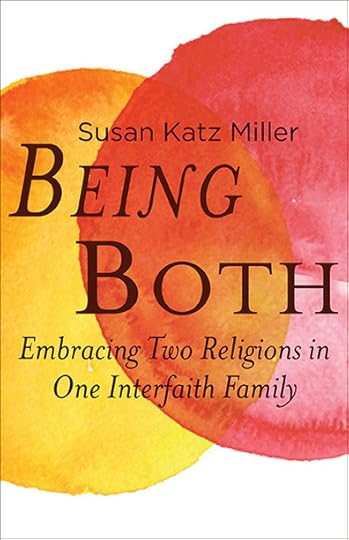
Indeed! Parenting is the toughest job this side of heaven, and because we are not parents, we won’t pretend to be experts! No one wants parenting advice from people who do not have children.
But we do know interfaith families whose practices we would hope to emanate. Susan Katz Miller, whose book Being Both carefully outlines the successful practices of interfaith families, has raised her own children in both Jewish and Christian practices and understanding. For Susan and many other families, it’s a “both/and” life, not an “either/or.” They’ve found that their experiences as a family are enriched when they practice both religions.
We can only image children’s lives being better for knowing there is a God who loves them so very much that God comes to us in many ways and circumstances.
From Kat R: This is not so much about interfaith marriage, but how does a woman become ordained in the Southern Baptist tradition? I thought they were pretty ix-nay on the whole women talking thing.
Great question! Some of you have already offered your responses, and I’ll offer my personal experience.
I was ordained by First Baptist Church in Reidsville, NC, the parish of my youth. At the time (2002), First Baptist Church had both affiliations with the Southern Baptist Convention and Cooperative Baptist Fellowship.
I attended First Baptist Reidsville for ten years before I was ordained; I was loved and formed by this community in ways I could have never imagined (see Chapter Four of Saffron Cross). The First Baptist community saw budding spiritual gifts far before I realized my call.
Baptists are an autonomous people. In our tradition, authority remains at the local church level. Unlike our connectional brothers and sisters, Baptists can make decisions without having to answer to a larger body or authority—a district, diocese, or Bishop. There is both beauty and challenge in a system like this.
For Baptists, ordination is a “setting apart” for the ministry of the Gospel of Jesus Christ that recognizes the ordained’s gifts for this ministry. In my case, it accepted that those gifts would never translate into my serving as a full-time senior pastor of an SBC church (those are not my gifts and it’s likely the Southern Baptist Convention wouldn’t fully accept/recognize my ordination at this time).
Instead, I’ve taken the route of ministry/service through chaplaincy, nonprofit organizations, and teaching. My ordination has served me well—particularly in the hospital setting where I was able to provide sacraments (or ordinances, as Baptists would prefer) for patients.
I’m grateful for the tradition of my youth and my ordination. I am currently a member of a progressive Baptist church whose affiliations include: American Baptist Churches USA, Alliance of Baptist, Association of Welcoming and Affirming Baptists, Baptist Peace Fellowship of North America, as well as the North Carolina Council of Churches. Come see worship with us anytime. All are welcome!
***
Be sure to check out Dana's book, Saffron Cross.
And you can browse other installments of our "Ask a..." series here.



October 4, 2013
San Diego, Louisville, and a sweet Kindle/Nook deal…
3 things:
1. I’m headed to San Diego today for the Youth Specialties National Youth Workers Convention, so if you plan to be there be sure to find me and say hello.
2. After that I’ll be spending Sunday (October 6) with the good people of St. Matthew’s Episcopal Church in Louisville, Kentucky, speaking at the 10 a.m. service and then sharing about my “year of biblical womanhood” at a 7 p.m. for their Dimensions of Faith series. Events are open to the public.
3. Finally, Amazon has selected A Year of Biblical Womanhood as one of its Kindle deals of the month, so you can get it for just $2.99 through the 31st. It’s also currently available at the same price for the Nook.
We’ll be getting back on schedule with the blog when I return from all this travel! Thanks for your patience.



October 2, 2013
Vulnerability and Christianese
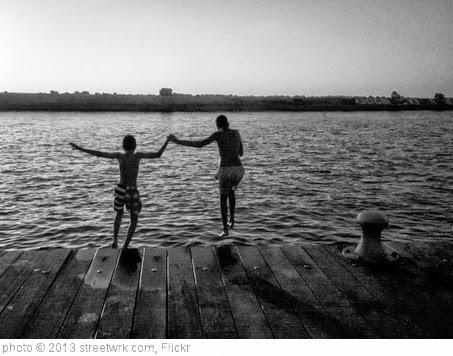
“Authenticity is a collection of choices that we have to make every day. It's about the choice to show up and be real. The choice to be honest. The choice to let our true selves be seen.”
– Brene Brown
I think we should cut Christianese some slack.
Like any culture, the evangelical culture in the U.S. has its own linguistic affectations and quirks, blending together lines from Scripture, hymns, and tradition with everyday colloquialisms and figures of speech.
And it’s not all bad.
I remember with fondness the way my great-grandmothers would shake her head at some baffling news or unsettling headline and in her thick Appalachian accent whisper, “Lordamercy”—the ancient Kyrie elesion rendered into a single, appropriate word. And I find it helpful to heed James’ advice now and then by punctuating a lengthy discussion over calendar dates and future plans with a reverent, “Lord willing.” It is beautiful and good to work the poetry of our faith into everyday conversation and meditation, to speak of “traveling mercies” and “fellowship” and of how “God is good all the time.” Each time I’m on a plane that rises above the clouds at sunrise, I think of Psalm 139—“If I rise on the wings of the dawn, or settle on the far side of the sea…even there your hand will guide me”—and I am grateful for the gift of these lovely words.
We have this deep well of beautiful, helpful language from which to draw, and we should not be ashamed of using the words and imagery handed down to us from the great cloud of witnesses that came before us to illuminate the present. Jesus himself did so often.
But in thinking about our use of “Christianese”—both as a writer and as a member of the Church—I think Christianese becomes unhelpful the moment we use it to protect ourselves from being honest with one another, the moment we use it to escape vulnerability.
We do this in several ways:
1) We employ Christianese when we have an idea.
I see this a lot in the religious publishing/blogging/conference “industry.” Folks protect their ideas by bubble wrapping them in an impenetrable layer of Christianese, so that suddenly, it’s not a just a book proposal but a “God thing,” not just a marketing strategy but a “Spirit-movement,” not just an idea for a blog post but “something God has laid on my heart,” not just a conference but a “Jesus revolution.”
On the one hand, I suspect this language gets used to convey true conviction and feeling, but on the other, it can also serve to protect a person’s ideas from criticism, input, and disagreement. It can be scary to put a bold idea out there to be digested and dissected by co-workers or the public, so sometimes we try to protect our ideas by claiming they are not merely our own, but God’s. The problem is this keeps us from being honest with one another and it drags God’s name into ideas and plans that may not be perfect and that may in fact benefit from the input of other wise people who are happy to respectfully engage a person’s ideas but are wary of “crossing” God by offering a new perspective. (It also tends to gloss over the hard work of real people, like agents, editors, sales reps, marketing people, designers, and assistants whose gifts and creative energy make a lot of what we create possible. An author once told me she didn’t need a literary agent because her only agent was God. I told her that, unfortunately, most publishing houses weren’t accepting submission from God right now, so maybe she ought to rethink that strategy.)
It may not seem so, but it requires a lot more honesty and vulnerability to tell someone you have an idea that you would like him or her to consider than to tell that person God has an idea you would like him or her to consider. In the latter, God serves as something of a buffer between you and the other person, protecting you from potential rejection. But this tends to break down actual conversation as both parties have to navigate carefully around the Christianese to try and guess at what one another actually thinks and wants. Suddenly, we’re not talking like normal people anymore. We’re talking like a bunch of repressed weirdos and no one knows what we’re actually saying to one another!
It’s really hard to put oneself in the vulnerable position of sharing an idea. But without that vulnerability, real friendships cannot grow and real ideas cannot flourish in the good soil of a diverse, engaged community.
2) We employ Christianese when we make a decision.
I think most Christians are eager to make God-honoring decisions in our lives, but sometimes we inadvertently close ourselves off to the wisdom and love of other people when we use Christianese to justify and explain our decisions. It’s hard not to cringe when someone confidently announces that God “led” her to do something careless or hurtful, and it’s hard not to get frustrated when certain specific lifestyle decisions are spoken of as “God’s way” when they just might not work for everyone.
It is much easier to say, “God told me to go to Uganda for a short-term missions trip,” than it is to say, “I’d like to go to Uganda for a short-term missions trip.” One protects us from input, disagreement, disappointment, and the risk we might be wrong by placing all responsibility for the decision onto God. The other requires vulnerability and opens us up to input, disagreement, disappointment, and the risk we might be wrong….which is harder, but ultimately, healthier. Owning our decisions helps us live among one another with more authenticity, openness, respect, and love…because it puts us on a level playing field as we each seek to do what is right while remaining mindful of our own imperfections.
3) We employ Christianese in the context of suffering.
My mother-in-law was recently in the hospital suffering from a “perfect storm” of health problems that suddenly afflicted an otherwise incredibly healthy woman. Now, my mother-in-law is one of the most kindhearted, giving, open, and grateful people you will ever meet, but even she expressed some dismay at Christians who approached her bedside, patted her on the hand and told her God would not give her more than she could handle.
I think what she wanted in that moment was not religious platitudes or shallow words of comfort, but for someone to sit next to her, hold her hand, and say, “This sucks. I’m here.”
Perhaps we resort to Christianese in the context of suffering because it is so freaking terrifying…for both the person suffering and those who feel helpless in the face of their loved one’s pain. To sit in that pain together is to put ourselves in an extremely vulnerable position…and I know what it’s like to want desperately to try and ease the tension and make it easier by quoting Philippians 4:13 or urging everyone to look on “the bright side.”
But we are not called to paper over one another’s suffering with platitudes. We are called to rejoice with those who rejoice and weep with those who weep. Jesus himself displayed this in his own life, and in his own suffering, time and again.
But when we resort to Christianese, when we start talking carelessly about God working all things together for good or having higher ways than our own, we risk losing our ability to truly empathize, to truly relate. Once again, we stop talking like normal people, and we start talking like robots! And often, we fail to communicate the gospel to those who aren't in on our religious "lingo" as a result!
As Brene Brown has so thoughtfully brought to our attention over the last few years, vulnerability is at the heart of healthy, authentic relationships. We cannot really love one another unless we are willing to be honest with one another, unless we are willing to risk being real.
The risk doesn't always pay off; it's not always safe - and that's why I think we build these defenses around it, why we resort to Christianese. When it comes to my relationship with God and with other Christians, I’m as quick as anyone else to try and protect myself from honest dialog by hiding behind flowery, unhelpful language (or, my favorite defense mechanism: to intellectualize everything so that it can’t hurt me).
But Jesus didn't call us to be safe. And the relationships that have meant the most to me, that have brought me closer to the Table, have been those in which we talk to one another like normal people, employing the language of our shared faith tradition when it illuminates the truth, but not when it obscures it.
Thoughts? Where else do you see Christianese employed as a way of protecting against vulnerability? How can Christians do a better job of talking like normal people when it comes to sharing ideas, making decisions, and experiencing suffering together in community?



October 1, 2013
Ask an Interfaith Couple (Christian/Hindu)….
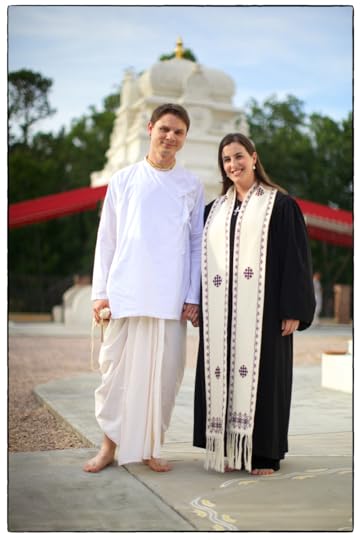
We continue our “Ask a…” series today with “Ask an interfaith couple…” While we’ve already discussed a mixed faith marriage between an atheist and a Christian, we haven’t yet had a chance to talk with a couple balancing two distinct religions, which is why I’m happy to introduce you to Dana and Fred.
Dana and Fred were matched on eHarmony in December 2008. Since then, their Christian-Hindu interfaith adventure has included: a sex-free Indian ashram honeymoon, austere religious pilgrimages, dietary compromises, deciding when and where to worship, and fights about prayer.
Dana is ordained in the Southern Baptist tradition and holds a Master of Divinity degree from Duke University Divinity School. Her first book, Saffron Cross: The Unlikely Story of How a Christian Minister Married a Hindu Monk releases today from Fresh Air Books, an imprint of Upper Room Books.
Fred is ordained in the Gaudiya Vaishnava tradition of Hinduism and served a as monk for five years. He is now the Assistant Director of Technology Services for the Division of Academic and Student Affairs at North Carolina State University.
Dana blogs at jdanatrent.com, tweets @jdanatrent, and spends too much time on Facebook.
You know the drill. If you have a question for Dana, Fred, or both, leave it in the comment section. Please take advantage of the “like” feature so we can get a sense of which questions are of most interest to readers. At the end of the day, I’ll send the top 7-8 questions to Dana and Fred for response. Look for the interview to appear next week.
Ask away!



September 26, 2013
Ask a racial reconciler….(response)
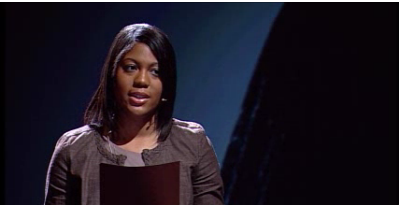
While it’s important for all of us to be engaged in the difficult, redemptive work of racial reconciliation, some people have made it their day job. Last week you posed some thoughtful, challenging questions via our “Ask a…” series to Austin Channing Brown, a woman of valor who does just that.
Austin serves as a counselor and adviser within dominant culture Christian ministries and churches. Her journey as a racial reconciler began in college with an experience called Sankofa- a three-day bus trip exploring Civil Rights sites throughout the South. Since then, she has worked with national speaker and consultant Rev. Dr. Brenda Salter McNeil, earned a Masters in Social Justice, and directed a short-term missions site on the west-side of Chicago, where she created interactive opportunities for young people to engage issues of poverty, injustice and race. Now Austin works with Christian churches and organizations like Willow Creek Community Church leading and collaborating on multicultural initiatives, alongside a team of fellow reconcilers. Austin is married to Tommie. You can check out Austin’s blog here. Or follow her on Twitter.
You submitted some excellent questions last week, and I think you will be really pleased with Austin’s wise and practical responses. Enjoy!
From Alyssa Bacon-Liu: How do you balance your passion for true reconciliation while also setting boundaries that help well-meaning privileged people understand that you are not obligated to teach them about racism/privilege and that you are not a spokesperson for the entire Black/POC community?
I am purposefully starting with this question because I think it’s extraordinarily important to stress it at the outset of this interview. I cannot and will not speak on behalf of all people of color, nor all black people, nor all women, or any other people group of which I am a member. I will not disrespect any of these communities by declaring that I have summarized our collective thoughts and can deliver them now. All I can share is my personal experience living at the intersection of ministry and racial reconciliation. I hope that is okay.
Believe it or not, this is exactly how I make sure that I don’t become the spokesperson for “all people." I just say it! I always want to make it perfectly clear that we are not a monolithic people who can be easily ascertained. When I am teaching, I also try to show this fact by including the voices of other black folks who may or may not agree with me. Nothing makes clearer that I am not speaking for all of us, than having two different perspectives in the room!
I love having conversations about race, culture, identity, and Christ, but I have specific forums where that conversation takes place. I once was coming out of a church service when a gentleman stopped me to ask how he can increase the diversity in his life since he lives in an all white neighborhood. Rather than answer his question on the spot, I told him that I would love for him to attend our church’s race class, where he’d be free to explore his questions in community with others. Simple. Polite. Direct. But we did not have a deep conversation about race that night. I will also set up meetings, plan phone calls, or suggest other resources when I am stopped randomly. Race conversations can be incredibly life-giving conversations or incredibly taxing- either way I want to be fully prepared and fully present! The only way I personally can make sure that happens is planning for the conversation in advance- boundaries!
From Ford1968: In practical terms, what does racial reconciliation look like? What are its hallmarks?
One of my favorite tools to explain what racial reconciliation looks like on an institutional level is a tool developed by Dr. David Anderson, pastor of Bridgeway Community Church and CEO of BridgeLeader Network, called the Multicultural Matrix. If you ever have an opportunity to attend his teaching on this- please go!
His team has continued to elaborate on the matrix, and Robyn Afrik (member of that team) has on her website a number of hallmarks that indicate where a church is on the journey of racial reconciliation! Check it out here! I highly recommend this tool as a starting place for understanding what racial reconciliation looks like beyond the flowery words, where we sometimes get stuck as churches.
From Rachel: One of the biggest obstacles I've observed in moving forward in conversations about race is that folks from the dominant culture are afraid of saying something "wrong" - of offending someone or sounding racist - so they avoid the conversation entirely. How do you create conversational environments that feel relatively safe for everyone involved without sidestepping the tough realities of racism and privilege? Are there certain methods, phrases, questions, or dialog strategies that help set people at ease so that the conversation is productive, even as it involves confronting difficult truths?
I could write a book on this question! I love facilitating conversations about race and consequently spend a lot of time thinking about this. So I will try to keep it short by giving you just three methods today.
Every class is done in partnership with at least 2 team members (sometimes we have 4 or 5) and we are racially diverse. That way there is not a singular expert in the room. No one person has all the answers, all the experience, or all the important opinions. We model the community that we want to create, and doing so allows people to be themselves.
We use a shared experience at the beginning of every class. The shared experience is never a “kumbayah” moment. These activities go straight to the heart of privilege or stereotypes or identity. We have found that creating safety and creating comfort are not the same thing! Our activities are hard, uncomfortable, and the responses/reactions are always on display. But these activities force a sense of vulnerability, display that we are all broken, and it’s truthfully why people come. Few people chose a race class if they don’t really want to talk about race. It also kick-starts the hard conversations because we’ve set everyone up to dive right in!
The last one I’ll share is about speaking our emotions. After each activity, when leading the discussion, we always ask the same question first- “How did that feel?” Common answers are anger, sadness, guilt, and shame. We don’t try to change the emotion, we just ask that everyone commits to a productive and respectful conversation even as they continue to feel the emotion (because lets be honest, my team is only reproducing the exact same emotions that are felt when race conversations happen randomly. If we can teach participants to name the emotion and still have an honest, respectful, messy conversation, we have truly achieved something!)
There are many more, but I hope that’s a helpful start! Anyone wanna help me write an ebook for the rest!?
From Suzannah: What are some of the blind spots harbored by progressive sorts that hinder the work of racial reconciliation?
There are two that drive me crazy. One is the assumption that there is nothing left to learn from those who are just beginning. Nothing will kill a conversation faster than someone who speaks like they have nothing to learn from others in the room. And it doesn’t really matter what color they are! Whoever comes into the room closed to learning risks ruining the safety in the room. They make vulnerability impossible for everyone else.
The second are progressives who become so enamored with their progress in the conversation that they forget I can speak for myself. The danger contained in the word “ally” is the ever-present possibility that he/she will start speaking for me rather than creating space for me to speak for myself. Having an ally that doesn’t see a need for my voice to be present is in many ways of no greater help to me than a declared racist who doesn’t think my voice matters at all.
In my opinion, it doesn’t create a desirable picture of reconciliation for one person to be consistently telling everyone’s story. I would rather that reconciler create space for more voices.
...And what kind of posture and partnering do you desire from would-be allies and white Christians, and how can we avoid white saviorism?
At its core, the white savior complex is the result of a distorted view of people of color and of self. The savior complex first makes people of color hopeless, helpless and in need of a savior. It assumes that we are unintelligent and incapable of creating change. It denies the success we have historically had in creating change for ourselves (in partnership with various allies), and robs us of the ability to continue leading that work. (I have to also admit that I am really weary of the storyline of the white hero who saves all the people of color, while in the meantime all the people of color working in their communities are largely ignored. But perhaps that’s a post for another day!)
The second overarching problem with the white savior complex, is that it is racist! I know, we are not fond of that word, but consider the above. If there is an underling attitude that people of color are inferior (less capable, less creative, less intelligent, less knowledgeable) and therefore in need of a savior… that sounds like a clear hierarchy of race. And this hierarchy is a distortion. God did not create an inferior race; we are all made in the Imago Dei. That is what makes reconciliation so beautiful; together we represent God!
So, how do we keep the complex at bay? I think there are many ways, but the one I’d like to promote today is being the learner rather than the leader (or if the leader, do so in shared leadership with a person of color). By placing yourself under the leadership of people of color who are your mentors, teachers, supervisors, or pastors you may find it hard to fall into a savior complex; instead you will be constantly listening, learning, and being guided by someone you need… rather than someone who “needs” you.
From Dana: I have two beautiful black daughters. They have regularly experienced discrimination and mockery by black people because they were adopted into a white home. Why does this exist, and what is the best way to deal with it?
This question saddens me tremendously, and while I could give 1,000 guesses about why this happens, the truth is not one of them will make you feel better. No possible reasoning I offer will ease a mother’s heart as she watches her children in pain. So rather than try to guess at the motives of these individuals, let me say this: We live in a broken world, and there is a lot of hurt around identity, culture and history. The best thing you can do as a mother is offer as much healing as you can for your girl’s identity. Tell your girls how beautiful they are, just as they are. Tell them how intelligent they are… how brave they are… how incredible they are… how they are fearfully and wonderfully made. Tell them that their version of black is beautiful. Tell them about black ancestry, about how much has been overcome. Love them. Love them hard. And if you can, counterbalance the negativity with positive black role model(s)- pastor, teacher, neighbor, or youth group leader. (I still remember a young, black, female role model I had at 8 years old! I have not seen her in almost 20 years but I love her still for how she treated me- with love and dignity during a time when I was unsure about the meaning of my black identity.)
From Alyssa Brooks-Dowty: I go to a pretty white church. It isn't COMPLETELY white, but there are a LOT of white people there. It's an awesome and real community, open to working on things. We have worked to include folks with disabilities, homeless folks, and folks from other cultures. We have a few non-white families, and some families with non-white children, but it feels like there's an invisible barrier to becoming more racially diverse. What can we do?
Without knowing the specifics of your church (denomination, location, demographics, staffing, etc), I can’t provide a lot of specific detail, but in my experience here are the vital components:
#1. Committed Leadership.
Your leader must feel called to this work because he/she will likely have to make changes to their leadership team or share leadership with someone who has different cultural norms. Becoming a multicultural church will also challenge (and change) many of the church’s cultural norms. The stress of both to your leader will be too much unless he/she is truly committed. That leads me to….
#2. A Diverse Team. Typically, pastors are much too busy to implement a strategy for achieving multiculturalism! So you need a committed group of people who are modeling reconciliation and moving it forward within the staff and congregation.
#3. An Outside Voice. The outside voice (ie-consultant, mentor, guide) may seem like a luxury, but race conversations get sticky and tricky. Having an outside voice will provide clarity, inspiration, and accountability when you need it most.
#4. Dollars. It simply cannot be ignored… you need a budget. You need to be able to purchase books, attend conferences, offer the congregation tools, bring in speakers, hire new staff members, or provide for whatever goals your team determines to implement. If you’d like to talk more about your specific context go to my website!
***
Thank you, Austin!
Keep up with Austin by following her on Twitter or subscribing to her blog. Check out the rest of our “Ask a…” series here.



September 24, 2013
A couple of fun updates to my calendar
Hello from Birmingham! Today I’m happy to add a couple of
very cool events to my speaking calendar:
The first is the Q Focus: Woman and Calling event in New
York City, scheduled for November 15, 2013.
I’ll be discussing vocation and calling alongside some other amazing
women, including Kathy Khang (who we just interviewed on the blog!), Lauren
Winner, Shauna Niequist, Nicole Baker Fulgham, and more.
The second is the Gay Christian Network Conference in
Chicago, scheduled for January 9-12, 2014. I’m thrilled to be joining many of
my friends at GCN, including Justin Lee (who we also interviewed on the blog!)
Dr. Christine Wiley, Rob and Linda Robertson, and Rev. Audrey Conner.
You can check out the rest of my fall speaking schedule
here. I’ll share the spring schedule a bit later. If you’re interested in booking,
contact Jim Chaffee.



September 22, 2013
Sunday Superlatives 9/22/13
I had the distinct pleasure of spending the weekend at Montgomery Belle State Park with the amazing women of Grace Pointe Church (Nashville, TN). Check out this very cool t-shirt, designed for the event by Kimberly Allen:
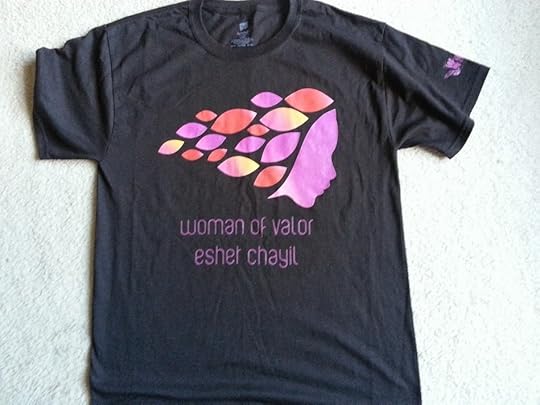
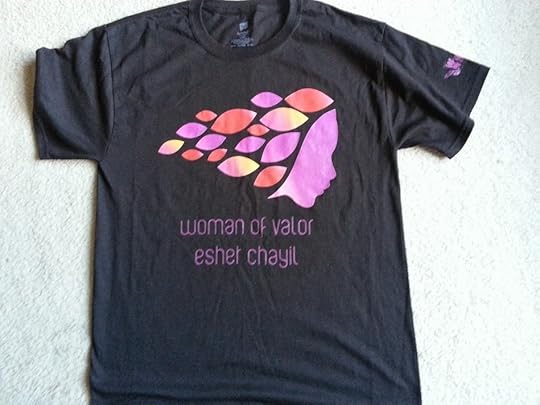
Next up is my old stomping ground of Birmingham, Alabama. I’ll be speaking at Samford University in Birmingham on Tuesday morning at 10 a.m. (Reid Chapel). Come by and say hello!
This will be followed by a trip to Taylor University at the end of the week. Obviously, with all this travel, posts might be a little spotty this week. Thanks for your patience!
Around the Web…Wisest:
Running Heads with “The Danger of Apologetics”
“The key apologetic for Christianity—far more important than knowing the right answers to hard questions—is love. Communities of faith that embody the kindness of God in cruciform ‘works of love’ are deeply attractive and are themselves evidence (not proof) of the truth of the gospel… Apologetics divorced from lives of love is like a gold ring in the nose of a pig. Apologetics is never just about being right; first and foremost it is about living right.”
Most Honest:
Becca Stanley with “When There Is Still Hope”
“Sometimes cynicism mounts; the weight and pressure building until it all feels hopeless, not to mention entirely-too-hard. If you’re not growing your ministry, if you don’t have measurable results, you’re dying. He smiles at me after telling me this, and I smile back bravely, sure he can see the waver beneath. Because I look at our “results” and I’m not sure we have anything we should tell potential donors. I can talk all day and climb up on my soapbox about stopping the cycle and helping the kids and fighting for their futures. But things in the trenches look different than they do from the air.”
Most Relatable:
Brian Valley with “Ten Thousand Pieces of Crumbling Faith”
“My faith was solid as a rock… As long as the ten thousand different ideas and qualifications that made up that rock all held true.”
Most Thought-Provoking:
Richard Beck with “The Witness of the Saints”
“If you aren't talking about biographies you aren't talking about God. That's the truth of the Incarnation. That is why the Spirit is poured out on flesh.”
Most Eye-Opening:
Jonathan Merritt at RNS with “12 Years a Slave’ portrays religion at its best and worst”
“Many Christian clergy advocated for slavery and, as historian Larry Tise notes in his book, Proslavery, ministers “wrote almost half of all defenses of slavery published in America” and believed the Bible taught that white people could own black people as work animals. Sadly, the examples in history don’t end with emancipation. Many American clergy vocally opposed the civil rights movement and supported Jim Crow laws. In the 1950s, The Alabama Baptist newspaper editorialized, “We think it deplorable in the sight of God that there should be any change in the difference and variety in his creation and he certainly would desire to keep our races pure.”
Most Helpful:
Jill Howard with “Struggles of Young Clergywomen”
“We come from all denominations, places, and backgrounds. Yet we all feel the call to serve the church, to care for others, and have promised to love the church, to love God, even in the midst of the ups and downs, the let downs, the challenges, and the uncertain future that opens up ahead of us. We have much work to do. We have much work to do as clergy women to educate people that yes, women are just as effective as men in ministry yes, we have much to offer, yes, we possess the gifts, talents, knowledge, and discernment to make a difference in the church and in the world. We love the church. We love the people of the church. We love God. We are here to serve.”
Most Thoughtful:
Kate Hurley at the Sexy Celibate with “Why It Sucks to be Intentionally Overlooked”
“There are funny ways that church culture reflects their unawareness of our disenfranchised loss—not in what they do give us, but in what they don’t give us. The sermons that aren’t given, the prayers that aren’t offered, the books that aren’t written. As if what we are going through is not that important or difficult.”
Best Interview:
Antonio Spadaro, S.J. interviews Pope Francis
Best Photo Series:
The 35 Most Spectacular Wildlife Photos from the National Geographic Photo Contest
Best Writing:
Sarah Bessey with “In which I am among the Spanish oaks again”
“I’m far away from that girl, now, and sometimes she makes me want to laugh and sometimes she makes me want to roll my eyes so hard they would fall out of my head. Wake up, wake up, wake up, I would say. Look around you: you’re being broken here I know, but this is embarking point for your wilderness and in the wilderness he will be your God. You gathered everything you needed for the journey among the limestone and the bluebonnets. Maybe healing stains backwards, in the same way that sorrow stains backwards through our lives. Young woman in the Austin airport, you’ll look back, I promise you will, and you will be filled with love and certain gratitude for the days you lived among them.”On the blog…
Most Popular Post:
Six Words You Need To Hear Today
Most Popular Comment:
In response to that post, Noah wrote:
"Thank you, thank you, thank you, thank you, thank you. I needed this today, desperately. And just about a week ago--on one of the hardest days of my life--I was yelling at God, being so upset about everything that was going on, and as I was driving, listening to rock music, I drove past what looked to be a turtle...I turned around and rescued the turtle. So your last paragraph just hit me so hard...because it was as if God told me that even though I was mad at Him, hurting so deeply, He was happy that I noticed the turtle and took care of it. So thank you again.”
***
So, what caught your eye online this week? What’s happening on your blog?



September 19, 2013
Ask a racial reconciler…
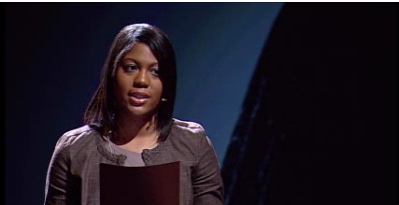
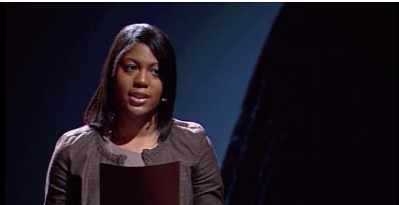
While it’s important for all of us to be engaged in the difficult, redemptive work of racial reconciliation, some people have made it their day job. For this week’s “Ask a…” interview I’m thrilled to introduce you to Austin Channing Brown who serves as a counselor and adviser within dominant culture Christian ministries and churches. Here’s how Austin describes herself and her work:
“My journey as a racial reconciler began in college with an experience called Sankofa- a three-day bus trip exploring Civil Rights sites throughout the South. My roommate and I went through this experience together, and I was never the same. Since then, I’ve worked with national speaker and consultant Rev. Dr. Brenda Salter McNeil, earned a Masters in Social Justice (in one of my favorite cities- Detroit!), and directed a short-term missions site on the west-side of Chicago, where I created interactive opportunities for young people to engage issues of poverty, injustice and race. Now I work with Christian churches and organizations like Willow Creek Community Church leading and collaborating on multicultural initiatives, alongside an amazing team of fellow reconcilers. When I come home at the end of the day, I am always welcomed by my supportive husband, Tommie and my sweet puppy, Mowgli.”
You can check out Austin’s blog here. Or follow her on Twitter.
You know the drill! If you have a question for Austin, leave it in the comment section. Please take advantage of the “like” feature so we know which questions are of most interest to readers. At the end of the day, I’ll choose 6-7 questions to send to Austin for response. You can look for the follow-up with Austin’s responses in about a week.
Check out the other interviews in our “Ask a…” series here.
Ask away!



September 18, 2013
Six Words You Should Hear Today

“I love to watch you play.'"
According to Rachel Macy Stafford, an author and special education teacher, those six words changed the way she related to her children. Rather than praising or critiquing their performances at swim meets, recitals, and soccer games, she began pulling her children close, and simply whispering, “I love to watch you swim,” “I love to hear you sing,” “I love to hear your read,” “I love to watch you play.”
Their reaction to these words, she said, was telling:
My child's face broke into her most glorious smile -- the one that causes her eyes to scrunch up and become little slices of joy. And then she did something I didn't expect. She threw herself against me, wrapped her arms tightly around my neck, and whispered, ‘Thank you, Mama.’ And in doing so, I swear I could read her mind: The pressure's off. She loves to hear me play; that is all.
"The pressure’s off. She loves to hear me play; that is all."
Even as someone who is not yet a mother, I see the wisdom of this approach. And as my eyes scanned the article, I thought of how desperately we adults need to hear these words too, perhaps most especially from the God who identifies as our Father and who is often compared to a Mother.
What a relief it would be to know the pressure’s off. God delights in our living and breathing and working and praying and that delight is not something we have to earn by doing everything right.
God just loves to watch us play.
Too many corners of the Church have been infected with a legalistic, performance-based view of God in which God stands over our lives with crossed arms and a disappointed scowl, applauding only when we get everything just right and rendering judgment on everything we do wrong. Some pastors seem to thrive in lording this disapproving God over their parishioners. As one pastor put it: “Some of you, God hates you. Some of you, God is sick of you. God is frustrated with you. God is wearied by you. God has suffered long enough with you. He doesn’t think you’re cute. He doesn’t think it’s funny.” He then proceeds to explain how to win back God's favor.
For too many Christians, God’s unmerited favor is a one-time gift that applies exclusively to eternal security. In the meantime, God’s favor has to be earned. It has to be fought for with one flawless performance after another. The Family of God is a competitive, disciplined, performance-based family that runs on the economy of gold stars, rules and shame. God is rendered into the classic nightmare sports parent whose favor has to be earned, who is always, always, always disappointed in us.
But this is not the God we encounter in Scripture or in Christ or in the Eucharist. The God we encounter there is the God in whom we live and move and have our being, the God who rejoices over His children with signing, the God who spreads Her wings over Her children like an eagle over her chicks, the God who loved the world enough to experience all of its pain alongside of us, the God who—as Nadia Bolz-Weber puts it—“would rather die than be in the sin accounting business anymore,” the God who loves to watch us play.
God doesn’t love us because we’ve earn it. God loves us because we are God’s children. God created this world and everything in it—don’t you think God delights in it? Don’t you think God loves us at least as much as a good parent who delights in the activities of her children, regardless of whether they get everything right?
This isn’t a performance-based relationship; it’s a relationship based on unconditional love and endless delight. We can breathe a deep and long sigh of relief because the pressure’s off. We’re not here to impress or perform; we’re here to revel in God’s delight.
So hear these six words from God today:
I love to watch you play.
Or perhaps:
I love to watch you write.
I love to watch you bake.
I love to watch you nurse.
I love to watch you read to your kids at night.
I love to watch you care for the sick.
I love to watch you take pictures.
I love to watch you study.
I love to watch you laugh.
I love to watch you seek the truth even when it’s hard.
I love to watch you be the church together, even when it’s imperfect.
I love to watch you love one another, even when it seems impossible.
I love to watch you eat and drink and dance and explore and worship and pray and get out of your car to move that poor little turtle out of the road…not because you do any of these things perfectly, but because you do them as my children.
Now sink into that sigh of relief and believe this today:
The pressure's off. God loves to watch me play. That is all.



Rachel Held Evans's Blog
- Rachel Held Evans's profile
- 1710 followers



